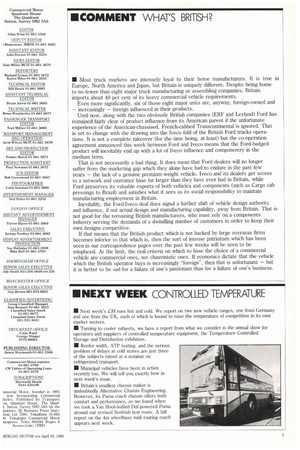• Most truck markets are intensely loyal to their home
Page 3

If you've noticed an error in this article please click here to report it so we can fix it.
manufacturers. It is true in Europe, North America and Japan, but Britain is uniquely different. Despite being home to no fewer than eight major truck manufacturing or assembling companies, Britain imports about 40 per cent of its heavy commercial vehicle requirements.
Even more significantly, six of those eight major units are, anyway, foreign-owned and — increasingly — foreign influenced in their products.
Until now, along with the two obviously British companies (ERF and Leyland) Ford has remained fairly clear of product influence from its American parent if the unfortunate experience of the American-chassised, French-cabbed Transcontinental is ignored. That is set to change with the drawing into the Iveco fold of the British Ford trucks operations. It is not a complete takeover (for the time being, at least) but the co-operation agreement announced this week between Ford and Iveco means that the Ford-badged product will inevitably end up with a lot of Iveco influence and componentry in the medium term.
That is not necessarily a bad thing. It does mean that Ford dealers will no longer suffer from the marketing gap which they alone have had to endure in the past few years — the lack of a genuine premium-weight vehicle. Iveco and its dealers get access to a network and customer base far larger than they have ever had in Britain, while Ford preserves its valuable exports of both vehicles and components (such as Cargo cab pressings to Brazil) and satisfies what it sees as its social responsibility to maintain manufacturing employment in Britain.
Inevitably, the Ford/Iveco deal does signal a further shift of vehicle design authority and influence, if not actual design and manufacturing capability, away from Britain. That is not good for the remaining British manufacturers, who must rely on a components industry serving the demands of a dwindling number of customers in order to keep their own designs competitive.
If that means that the British product which is not backed by large overseas firms becomes inferior to that which is, then the sort of intense patriotism which has been seen in our correspondence pages over the past few weeks will be seen to be misplaced. At the limit, the real criteria on which to base the choice of a commercial vehicle are commercial ones, not chauvinistic ones. If economics dictate that the vehicle which the British operator buys is increasingly "foreign", then that is unfortunate — but it is better to be sad for a failure of one's patriotism than for a failure of one's business.






























































